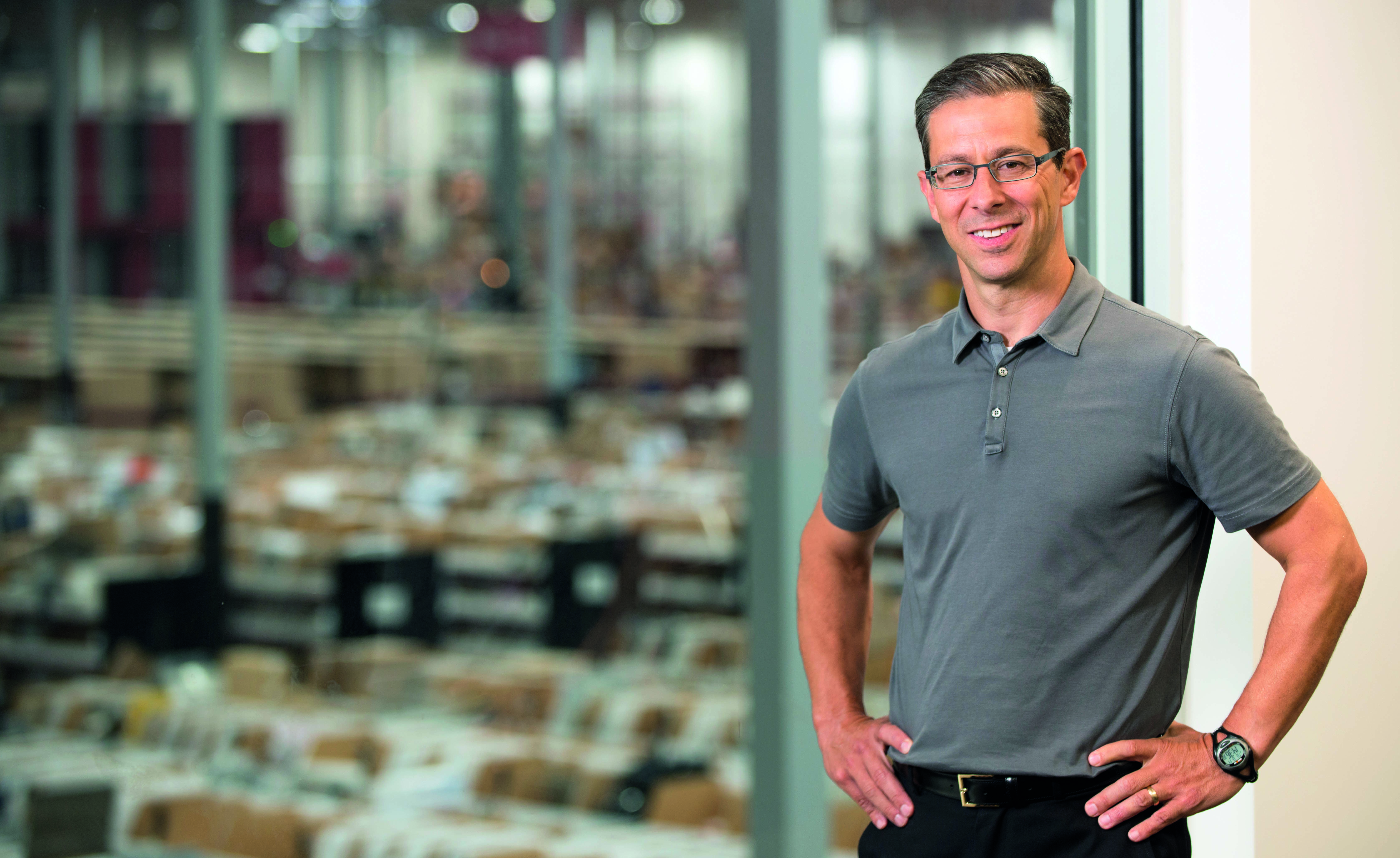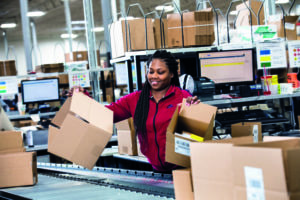
Ilinois-headquartered Parts Town is the fastest growing distributor of original equipment manufacturer (OEM) repair and maintenance equipment parts for the foodservice industry. Despite boasting origins dating back to 1930, Parts Town, as the industry would now recognize it, was officially founded in 1987, when the company started building its current leadership team. At that point, the company had five team members and an annual turnover of $3m.
CEO Steve Snower joined the company in 2004. In the past 15 years employee numbers have grown to 550 in the core parts distribution part of the business and 1,600 in the whole company. Another 10 acquisitions later and the company’s revenue now sits at $600m.
“It’s a pretty unique growth story,” says Snower of those past 15 years. “Our slowest growth year was 24%. We’ve delivered 35% compound annual organic growth over 15 years.”
So how was this all achieved? “Building a unique culture,” says Snower. “That culture is based on our five values: safety, integrity, passion, courage and innovation. They really differentiate us.”
It was also achieved because the company has an informal structure, with “almost no hierarchy or bureaucracy,” he says. “Our philosophy is to downplay experience in favor of talent. You can’t train people to be enthusiastic, but we can always educate them with what we’re trying to accomplish. That has led us to a series of innovations about the way parts and information are distributed.”
Digital dominance
And some of those innovations have been truly groundbreaking. Parts Town launched the parts and service industry’s first e-commerce website in 2007, bringing technical documents, diagrams and inventory online for the first time, rather than solely in paper form. The website receives more than three million downloads each year. In 2010 it launched the first app for the parts sector – it now has 90,000 app users – while the first mobile-optimized website soon followed.
“We brought the industry into the digital world,” says Snower, who claims Parts Town launch “at least two big breakthrough innovations” each year. “We have a three- to five-year first mover advantage on competitors.”
In 2004 Parts Town launched its ‘same day shipping ’ in-stock guarantee. It also enables customers to see real time inventory and the ability to check when warranties expire, and provides a Serial Number Lookup function. While it offers the latest technological tools to customers – approximately 55% of orders are via digital platforms – for those who still require the human touch, the company also ensures it answers the phone “with a friendly voice” and within three rings.
“We assume greater search will come from technology [in the future] but there will always be a need for people too. That’s not going away,” says Snower. “So, we have really enthusiastic, energetic sales people. We’re in the emergency business, so we want the emergency to be dealt with in a friendly, helpful way.”
The innovation Parts Town promotes comes from encouraging everyone within the company to present their ideas, says Snower. “I had some pretty good ones, back in the day,” he laughs, “but there are now more and more talented people capable of giving us good ideas. We want to be the originator of things. Our culture is our cornerstone for doing that.” Parts Town uses a crowd-sourcing tool to capture ideas submitted within the company – anything from a small process improvement suggestion to a major app development. The ideas get voted on and then progressed forward.
“We all work together as a team,” says Snower. “The facility is open, inviting and colorful. We try to make it fun and unique.”
Deep relationships
Parts Town now partners with “virtually all” major chain operators and boasts “unique partnerships” with foodservice equipment manufacturers, 120 of whom now deploy the company to source all their parts.
“We want deep relationships with all OEM manufacturers – we don’t do generics or copies. We have 200,000 customers globally in 120 countries around the world,” says Snower.
“We are going big into Europe. We’re just beginning. Our growth rate is accelerating. We’re excited.”
While the future looks exceptionally bright, the firm came from humble beginnings. The Parts Town business was born out of a family group of businesses founded in 1930 in the Chicago area. These were primarily commercial heating, ventilation and air conditioning (HVAC) repair companies, later becoming a group of equipment service companies.
The family business was on its third generation by the 1980s – and successful. Parts Town was born out of this group in 1987 – at first intended to supply parts to the companies within the business itself. Bill Reedy was the third generation CEO of that company.
“His business was pretty much entirely field service operations,” says Snower. “Over time, Bill came to realize there was a big opportunity in parts distribution. But it really wasn’t his area of expertise, which was more on the service side.”
Snower and Reedy met and built a friendship in the early 2000s, while studying for their MBAs at The Kellogg School of Management at Northwestern University. “Bill asked me to come and take a look at his business, because it wasn’t growing the way he thought it could,” says Snower. “I was running sales and marketing for a large electronic component distribution business [in a different sector], having spent 10 years there. I came and looked at the business and gave him some ideas. Those ideas led to some other ideas.”
It was, says Snower, unique timing. “Bill wanted to do something more with the business. I was looking to move out of the large company bureaucracy and really wanted to do something more entrepreneurial, build a culture and a team. One thing led to another, and we figured out a way to partner – I would run the parts distribution business and he and his family would run the HVAC service businesses.”
The two formed that partnership in 2003. There were five team members then. One of the things Snower is most proud of is that all five team members are still with the company today.
Finding focus
“At that point we started thinking, ‘What do we want our culture to be? What are the values that will best drive the behaviors we’re looking for? How are we going to differentiate this business? What can we do that will make Parts Town unique and allow it to grow successfully?” he says.
The team focused on four key areas. “First, there was no distributor out there fully supporting the manufacturers. The other distributors of any scale in the industry were competing against manufacturers by selling non- OEM parts. And they weren’t really partnering with the manufacturers. So, we decided early on we were going to be ‘pure OEM’ in order to provide the safest, most reliable parts that protect warranties.”
Second, Snower wanted the company to embrace technology. “There was no e-commerce or mobile technology in the foodservice equipment parts space at all.
One of the things we wanted was to be the company that would bring technology to the industry. “We benchmarked against a lot of different businesses – and not only those in B2B distribution. We were looking for features and functions that could be valuable to our customers. It was a big deal when we developed the first version of our website in 2007. The day we launched the site, orders started trickling in. Not a huge number, but I was like, ‘Whoa! We’ve got an order… We’ve got another order!’ The site got picked up very quickly.”
The next key area was to focus on developing Parts Town’s unique customer-oriented offering. “We built a customer experience focused business where the whole design is about serving the customer,” says Snower.
Finally, the company worked hard to put its people at the center of the business. “Those that are closest to the customer – our customer experience reps and distribution center operations people – hold the most important roles in the business. The management leadership is really just there to support those efforts. We do a lot culturally to make sure that those individuals are getting the recognition, support and training they need and deserve,” he says.
When Snower first took the helm of Parts Town, major chain restaurants with operations across the US were frequently buying from “50 different small parts suppliers in 50 different states,” he says. “We brought the convenience of buying all your parts in one place, getting consistent information, consistent pricing and delivery, analytics around your business and customization to support specific needs.”
The company also invested in its relationships with manufacturers, which falls under the remit of vice president of manufacturer partnerships, Clint Holder. “We really look at manufacturers as customers as well,” says Snower.
“We invest in those relationships to develop the best way to access the parts, inventory them and ensure we can give their customers a great experience. We want to make the manufacturer look good every time. When someone buys a piece of equipment they feel confident because Parts Town is partnered with them.”
Growing and learning
Those cultural investments, which triggered huge organic growth after 2004, in turn allowed Parts Town to start flexing its muscles on the acquisition trail. The company has made 10 acquisitions since 2015, six being primarily service-led companies.
The vast majority of Parts Town’s business is parts distribution, with a little less than 20% of overall revenue coming from field service repairs. With these repair services Parts Town has retained local branding, enabling teams with “deep knowledge and relationships” to focus on local markets.
Of the four parts-distribution businesses Parts Town has acquired, the most recent and high profile – notably perhaps because it was the company’s first outside the US – was the purchase of First Choice in the UK. “We spend a lot of time with those [acquired companies], educating them on the core values of Parts Town, teaching them the history and investing in them and their facilities so they look and feel like Parts Town. We really embed them into all we do at Parts Town in terms of core values, education, recognition and rewards,” says Snower.
Despite having experienced such exponential growth, Snower is not overly concerned about Parts Town becoming so big it loses the fleet-footed agility and embedded culture among employees the company has strived to build. “I don’t know if I’d use the word ‘worry’ when thinking about that, but we’re very focused on making sure the culture is sustained and strengthened as the company gets larger,” he says.
“It’s the most important – and probably the hardest – thing we do. But we’re always paying attention to it. We’re imperfect, a work in process. But I feel we’re doing a really good job. We like to create opportunities for great people.”
Michael Jones


